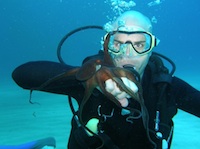Maker Faire Weekend
 One of my favorite events of the year is being held this weekend in the Bay Area. Maker Faire, now in its 6th year, is an exposition of hands-on workshops, do-it-yourself projects, and demonstrations that bring together art, technology, and lots of creativity. I remember when I visited for the first time 5 years ago, being wowed by the Eepy Birds Diet Coke & Mentos geysers and a life-size version of the “Mouse Trap” game (the marble and tiny plastic bathtub in the board game became a bowling ball and an actual bathtub!).
One of my favorite events of the year is being held this weekend in the Bay Area. Maker Faire, now in its 6th year, is an exposition of hands-on workshops, do-it-yourself projects, and demonstrations that bring together art, technology, and lots of creativity. I remember when I visited for the first time 5 years ago, being wowed by the Eepy Birds Diet Coke & Mentos geysers and a life-size version of the “Mouse Trap” game (the marble and tiny plastic bathtub in the board game became a bowling ball and an actual bathtub!).
Each time I’ve attended, I’ve been amazed by the creativity and ingenuity evident in the hundreds of projects that fill the exhibit halls. How does one bring the innovation, critical thinking, and problem solving that make Maker Faire so inspiring back to the science classroom?
 First, the sponsors of Maker Faire publish “Make,” a quarterly magazine that celebrates inventive do-it-yourself projects. While some of the projects are a bit complex for my middle school students, many of the clearly explained projects in Make use everyday objects and are appropriate for an inspired 13-year-old student. When I taught a “Design Challenge” elective, having this magazine on my classroom bookshelf both gave me projects to complete with my students (i.e., engineer your own alarm or doorbell system for your bedroom) and served as a resource for students to turn to for inspiration for their own projects.
First, the sponsors of Maker Faire publish “Make,” a quarterly magazine that celebrates inventive do-it-yourself projects. While some of the projects are a bit complex for my middle school students, many of the clearly explained projects in Make use everyday objects and are appropriate for an inspired 13-year-old student. When I taught a “Design Challenge” elective, having this magazine on my classroom bookshelf both gave me projects to complete with my students (i.e., engineer your own alarm or doorbell system for your bedroom) and served as a resource for students to turn to for inspiration for their own projects.
Secondly, Maker Faire is expanding – adding more cities and a “Maker Education Day” to their schedule. The event is next headed to North Carolina, Vancouver, and Detroit, with New York City to follow in the fall. Instead of bringing Maker Faire back to your classroom, bring your classroom to the event!
Finally, the San Jose Museum of Technology and Innovation has developed a “Design in Mind” curriculum that is sure to inspire creativity and critical thinking in your students. Their program includes both an engineering competition at the museum and a set of lesson plans that a teacher can implement in his or her classroom. The lessons present students with real world problems along with a process for acquiring knowledge, brainstorming solutions, and then testing (and retesting) their ideas. From designing earthquake-proof structures to engineering a tool to help a friend reach the top shelf of a cabinet from her wheel chair, I’ve found my students both inspired and engaged by the “Design in Mind” lessons.
I’ll be taking my camera along to Maker Faire this Saturday and will share some of my discoveries in the coming week!
